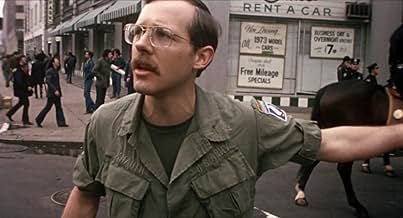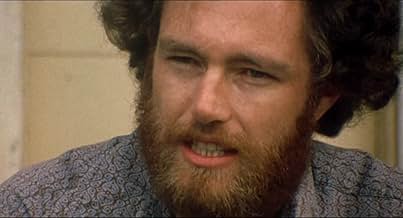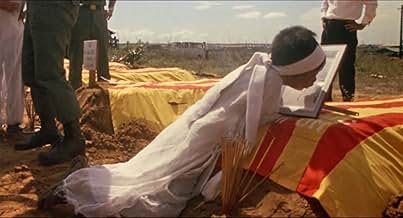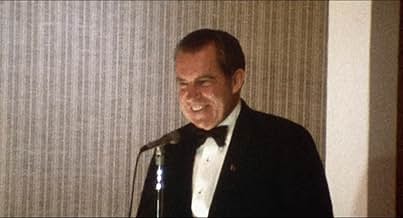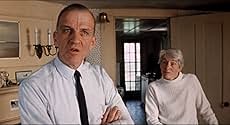IMDb-BEWERTUNG
8,2/10
6448
IHRE BEWERTUNG
Füge eine Handlung in deiner Sprache hinzuA startling and courageous landmark documentary that unflinchingly confronted the United States' involvement in Vietnam at the height of the controversy that surrounded it.A startling and courageous landmark documentary that unflinchingly confronted the United States' involvement in Vietnam at the height of the controversy that surrounded it.A startling and courageous landmark documentary that unflinchingly confronted the United States' involvement in Vietnam at the height of the controversy that surrounded it.
- 1 Oscar gewonnen
- 5 Gewinne & 1 Nominierung insgesamt
Ngo Dinh Diem
- Self - President of South Vietnam
- (Archivfilmmaterial)
John Foster Dulles
- Self - Secretary of State, 1953-1959
- (Archivfilmmaterial)
Kay Dvorshock
- Self
- (Archivfilmmaterial)
Dwight D. Eisenhower
- Self - President of the United States
- (Archivfilmmaterial)
Lyndon B. Johnson
- Self
- (Archivfilmmaterial)
- (as Lyndon Johnson)
John F. Kennedy
- Self - President of the United States
- (Archivfilmmaterial)
Robert F. Kennedy
- Self - U.S. Senator
- (Archivfilmmaterial)
William Marshall
- Self
- (as Sgt. WIlliam Marshall - Detroit)
Eugene McCarthy
- Self - U.S. Senator
- (Archivfilmmaterial)
Ho Chí Minh
- Self
- (Archivfilmmaterial)
Empfohlene Bewertungen
Occasionally Hearts and Minds comes over as too obvious and aggressive, as in the shockingly unflattering edits of glib, racist Americans piled one on top of another and the literal link the director draws between football and war. (Then again, I'm 31 years old and just don't know how open such racism was then, but the cuts from bigot to bigot are just brutal and perhaps it's wishful thinking on my part to assume that the director was unfair.) Also, it seems the communist NLF did no wrong that was worth putting in the film. Instead the director concentrated on eloquent nationalist sentiments. I happen to agree entirely with the assessment of the war shown in the film, but even with my sympathies it's hard not to notice that this film that concentrates so brilliantly on the suffering of real people before an evil policy focuses almost solely on the crimes of the Americans and their South Vietnamese allies. But maybe that was someone else's film to make and, at that moment in time, the director probably felt that there was enough coverage of NLF as just plain evil people. It's a small gripe about such a mammoth film. Documentary is not Truth, no retelling of an event ever is. Hearts and Minds is an unapologetically partisan film and is so much the better for being honest about it.
I'm `oriental' myself. Well, `oriental' enough that I know all those slurs and dismissive comments would have applied to my family and me. It was absolutely eerie for me to see people from Gen. Westmorland down to Americans watching parades on Main St. who had nothing but contempt for the people that to this day many swear the US was trying to save.
I'm not sure how many times I've ever seen the victim of bombing express himself outside of this film and that's sad. How many people were bombed in the last century? Millions certainly. In the US we've become so accustomed to hearing that our foreign policy requires almost annual bombings somewhere on earth. Particularly during the Clinton years, punishing through air strikes became so routine that it barely merited news coverage. These attacks may not be as indiscriminate as they used to be, but how many people in our history did that one anguished man speak for as he wept about his family and his home?
The sheer carnage on display in Hearts and Minds made the whole war film genre seem perversely sentimental to me. It's seldom helpful to hold up fiction to docu-footage, but, in this case, any number of moments from Hearts and Minds makes otherwise impressive films like Apocalypse Now! and Platoon seem like acts of bad taste.
I'm `oriental' myself. Well, `oriental' enough that I know all those slurs and dismissive comments would have applied to my family and me. It was absolutely eerie for me to see people from Gen. Westmorland down to Americans watching parades on Main St. who had nothing but contempt for the people that to this day many swear the US was trying to save.
I'm not sure how many times I've ever seen the victim of bombing express himself outside of this film and that's sad. How many people were bombed in the last century? Millions certainly. In the US we've become so accustomed to hearing that our foreign policy requires almost annual bombings somewhere on earth. Particularly during the Clinton years, punishing through air strikes became so routine that it barely merited news coverage. These attacks may not be as indiscriminate as they used to be, but how many people in our history did that one anguished man speak for as he wept about his family and his home?
The sheer carnage on display in Hearts and Minds made the whole war film genre seem perversely sentimental to me. It's seldom helpful to hold up fiction to docu-footage, but, in this case, any number of moments from Hearts and Minds makes otherwise impressive films like Apocalypse Now! and Platoon seem like acts of bad taste.
Hard hitting documentary directed by Peter Davis in how the US got itself involved in the War in Vietnam that ended up tearing the country apart. Made in 1974 before the Vetcong guerrillas and North Vietnamese Army overran the country the film shows the pitfalls that the US chose to overlook in getting itself stuck in the mud swamps and jungles that was the Vietnam War.
There's really no one US President to blame for getting the country into that bloody mess of a war in that we see it was a team effort from Pres. Truman to Pres. Nixon and every other US Chief Executive, Eisenhower Kennedy & Johnson, in between. The French who were involved in the first Vietnam or Indochina War was soundly defeated by Ho Chi Minh's, known as "The Enlighten One", Viet Minh forces in the bloody and drawn out battle of Dien Bien Phu in May 1954. That jungle battle ended the conflict that resulted in the loss, French and Vietnames military and civilians, of over 700,000 lives. During the almost 8 years of of fighting in Indochina War the US was far from neutral in supporting the French with almost 80% of the arms and money for the French to keep the war going.
With the free and UN sponsored elections to unify both north and South Vietnam set to be held in 1956 and Ho Chi Minh being a sure shot of winning them the US under Pres. Eisenhower set up the puppet Diem to be South Vietnam's fist unelected president. This set the stage for the second Vietnam War that was to involved as much as 550,000 US troops and lasting 16 years from 1959 to 1975, the longest war in US history, ending up costing almost 60,000 American lives; Not to mention the some 3 million Vietnamese,from both North & South Vietnam, who perished in it.
Among the many persons who were personally involved in the Vietnam war the one who made the biggest impact on me in the movie was former Secretary of Defense Clark Clifford. Clifford in an interview admitted that those Generals and politicians conducting the war had no idea in not only how to win it but who they were fighting against. Everything that they did failed miserably and they ended up stuck in an unwindable war because in their mind by ending it, or withdrawing from the country, would lead to a "Domino Effect" where all of South-East Asia would end up falling into Communists hands. Which to them was worth the enormous loss of life, American & Vietnamese, that this bottomless quagmire of a war was was costing! As it turned out the "Domino Effect" turned out to be pure fiction with no other country in that part of the world turning Communist and Vietnam now a united country being one of the US', next to Communist China, biggest trading partners in Asia!
What the film brings out best is how most of the American public finally realized that they've been had in going along with the bankrupt policies of their leaders who conned them, like in the faked and infamous Tonkin Gulf incident, into supporting the war. Taking to the street in massive anti-war demonstrations with hundreds of returning Vietnam war vet participating in them was what really brought the war to an end. But it took almost 6 years from 1966 to 1973 for it to happen! And it was during that time the majority of the almost 60,000 American and 3 million Vietnamese lives lost in the war were snuffed out.
In the end the Vietnam War turned out to be a war that many from the Truman Eishenhower Kenndey Johnson & Nixon Administrations who whole hearted supported it at first would now, after all the facts are in about it, like to forget!
There's really no one US President to blame for getting the country into that bloody mess of a war in that we see it was a team effort from Pres. Truman to Pres. Nixon and every other US Chief Executive, Eisenhower Kennedy & Johnson, in between. The French who were involved in the first Vietnam or Indochina War was soundly defeated by Ho Chi Minh's, known as "The Enlighten One", Viet Minh forces in the bloody and drawn out battle of Dien Bien Phu in May 1954. That jungle battle ended the conflict that resulted in the loss, French and Vietnames military and civilians, of over 700,000 lives. During the almost 8 years of of fighting in Indochina War the US was far from neutral in supporting the French with almost 80% of the arms and money for the French to keep the war going.
With the free and UN sponsored elections to unify both north and South Vietnam set to be held in 1956 and Ho Chi Minh being a sure shot of winning them the US under Pres. Eisenhower set up the puppet Diem to be South Vietnam's fist unelected president. This set the stage for the second Vietnam War that was to involved as much as 550,000 US troops and lasting 16 years from 1959 to 1975, the longest war in US history, ending up costing almost 60,000 American lives; Not to mention the some 3 million Vietnamese,from both North & South Vietnam, who perished in it.
Among the many persons who were personally involved in the Vietnam war the one who made the biggest impact on me in the movie was former Secretary of Defense Clark Clifford. Clifford in an interview admitted that those Generals and politicians conducting the war had no idea in not only how to win it but who they were fighting against. Everything that they did failed miserably and they ended up stuck in an unwindable war because in their mind by ending it, or withdrawing from the country, would lead to a "Domino Effect" where all of South-East Asia would end up falling into Communists hands. Which to them was worth the enormous loss of life, American & Vietnamese, that this bottomless quagmire of a war was was costing! As it turned out the "Domino Effect" turned out to be pure fiction with no other country in that part of the world turning Communist and Vietnam now a united country being one of the US', next to Communist China, biggest trading partners in Asia!
What the film brings out best is how most of the American public finally realized that they've been had in going along with the bankrupt policies of their leaders who conned them, like in the faked and infamous Tonkin Gulf incident, into supporting the war. Taking to the street in massive anti-war demonstrations with hundreds of returning Vietnam war vet participating in them was what really brought the war to an end. But it took almost 6 years from 1966 to 1973 for it to happen! And it was during that time the majority of the almost 60,000 American and 3 million Vietnamese lives lost in the war were snuffed out.
In the end the Vietnam War turned out to be a war that many from the Truman Eishenhower Kenndey Johnson & Nixon Administrations who whole hearted supported it at first would now, after all the facts are in about it, like to forget!
There are certain subjects so horrendous and so important that fictionalizing them, regardless of the good intentions of the film maker, can only trivialize them. "Schindler's List", "JFK" and "The Deer Hunter" come to mind.
Give me a good documentary any time, and this is one of the best.
It takes the silly rhetoric of our leaders and juxtaposes it with images showing the horrendous results of their short-sighted policies.
If you want to know what the VietNam war was really all about, (and why so many of us were against it,) skip "Apocalypse Now", "Go Tell the Spartans" and "Full Metal Jacket" and watch this one.
Give me a good documentary any time, and this is one of the best.
It takes the silly rhetoric of our leaders and juxtaposes it with images showing the horrendous results of their short-sighted policies.
If you want to know what the VietNam war was really all about, (and why so many of us were against it,) skip "Apocalypse Now", "Go Tell the Spartans" and "Full Metal Jacket" and watch this one.
10greg-253
Peter Davis created one of the most moving accounts of the Vietnam War and the attitudes at home when he produced "Hearts and Minds".
The film looks unflinchingly at the nature of power and horrible consequences of war. It is very much a pro-peace film, but uses the people who were there to speak for themselves. It also seeks to probe deeper underneath the American psyche of the times and evolves into a historical document about the violent social rupture that happened between the fifties and the sixties.
In many ways, it feels like a punch in the gut to watch the film. So many ideologies are laid bear....so many were false or misleading.
In the end, the film leaves you thinking about the price of war - and who is given the task to bear that price.
Truly deserving of the Oscar it received - and worthy of repeated viewing.
The film looks unflinchingly at the nature of power and horrible consequences of war. It is very much a pro-peace film, but uses the people who were there to speak for themselves. It also seeks to probe deeper underneath the American psyche of the times and evolves into a historical document about the violent social rupture that happened between the fifties and the sixties.
In many ways, it feels like a punch in the gut to watch the film. So many ideologies are laid bear....so many were false or misleading.
In the end, the film leaves you thinking about the price of war - and who is given the task to bear that price.
Truly deserving of the Oscar it received - and worthy of repeated viewing.
A documentary of the conflicting attitudes of the opponents of the Vietnam war.
Roger Ebert wrote, "Here is a documentary about Vietnam that doesn't really level with us... If we know something about how footage is obtained and how editing can make points, it sometimes looks like propaganda... And yet, in scene after scene, the raw material itself is so devastating that it brushes the tricks aside." Exactly right. The folks who made this are clearly anti-war, but some of the footage they get is unforgettable.
Most notably is the interview with General William Westmoreland where he says, "The Oriental doesn't put the same high price on life as does a Westerner. Life is plentiful. Life is cheap in the Orient." How can that be interpreted any other way?
The movie was chosen as Academy Award for Best Documentary Feature at the 47th Academy Awards presented in 1975. This win was not only well-deserved, but opened the door for possibly an even better Vietnam documentary: Errol Morris' "The Fog of War: Eleven Lessons from the Life of Robert S. McNamara" (2003), which also won the Oscar.
Roger Ebert wrote, "Here is a documentary about Vietnam that doesn't really level with us... If we know something about how footage is obtained and how editing can make points, it sometimes looks like propaganda... And yet, in scene after scene, the raw material itself is so devastating that it brushes the tricks aside." Exactly right. The folks who made this are clearly anti-war, but some of the footage they get is unforgettable.
Most notably is the interview with General William Westmoreland where he says, "The Oriental doesn't put the same high price on life as does a Westerner. Life is plentiful. Life is cheap in the Orient." How can that be interpreted any other way?
The movie was chosen as Academy Award for Best Documentary Feature at the 47th Academy Awards presented in 1975. This win was not only well-deserved, but opened the door for possibly an even better Vietnam documentary: Errol Morris' "The Fog of War: Eleven Lessons from the Life of Robert S. McNamara" (2003), which also won the Oscar.
Wusstest du schon
- WissenswertesDuring his Oscar acceptance speech, producer Bert Schneider read a letter from the head of the Viet Cong lauding his film. Bob Hope prompted Oscar host Frank Sinatra to disclaim any political statements that had been made during the show.
- Zitate
Daniel Ellsberg: The question used to be: might it be possible that we were on the wrong side in the Vietnamese War? But, we weren't on the wrong side. We are the wrong side.
- Crazy CreditsThe listed translators credited in the movie (Le Thai To, Trung Trac, Le Thanh Tong and Trung Hung Dao) were all Vietnamese generals who had defeated the Chinese in various times from the first century C.E., to the fifteenth century C.E. The translator listed as Nguyen Ai Quoc was an early alias of Ho Chi Minh, founder of the Vietnamese Communist Party. I have no knowledge of the last listed translator, Barbara Gore. Apparently, someone played a good joke on the producers of this film, if it wasn't the translators themselves.
- VerbindungenFeatured in Sneak Previews: Take 2: Vietnam Movies (1980)
Top-Auswahl
Melde dich zum Bewerten an und greife auf die Watchlist für personalisierte Empfehlungen zu.
- How long is Hearts and Minds?Powered by Alexa
Details
- Erscheinungsdatum
- Herkunftsland
- Offizielle Standorte
- Sprachen
- Auch bekannt als
- I frihetens namn
- Drehorte
- Produktionsfirmen
- Weitere beteiligte Unternehmen bei IMDbPro anzeigen
Box Office
- Bruttoertrag in den USA und Kanada
- 28.754 $
- Eröffnungswochenende in den USA und in Kanada
- 8.556 $
- 24. Okt. 2004
- Weltweiter Bruttoertrag
- 28.754 $
Zu dieser Seite beitragen
Bearbeitung vorschlagen oder fehlenden Inhalt hinzufügen

Oberste Lücke
By what name was Hearts and Minds (1974) officially released in India in English?
Antwort

